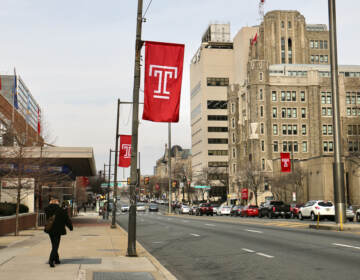Appeals court seems baffled by Philly teachers contract strife
“Dysfunctional … abnormal … extreme.”
These were just a few of the words a Commonwealth Court judge used Wednesday to describe the relationship between the Philadelphia School Reform Commission and its teachers union.
The hearing in Harrisburg reviewed the SRC’s Oct. 6 decision to unilaterally terminate the PFT contract and impose health-care concessions on members. Most teachers union members currently don’t pay a share of their premiums.
Under the district’s proposed plan, PFT members would incur wildly different out-of-pocket costs depending on their situations — from just over $300 per year to more than $8,000 per year.
The district had also planned to stop payments to the union’s health and welfare fund in October. A Philadelphia judge then issued an order blocking those changes, pending the Commonwealth Court’s ruling on the core issues.
District officials argue these changes are necessary in order to pump $54 million in savings back into its resource-strapped schools this year – $200 million over four years.
‘Meet and discuss unit’
Addressing the five-judge panel, School Reform Commission counsel Mark Aronchick said the essential question before the court was whether or not the SRC’s action had basis in law.
“The answer is absolutely and unequivocally ‘yes,'” he said, citing language in the 1998 legislation that paved the way for Philadelphia’s “distressed” school district to be taken over by the SRC, which has three state appointees and two mayoral appointees.
Union officials reject that reading of the law. In October, the Philadelphia Court of Common Pleas agreed to the PFT’s request for a preliminary injunction to put a hold on the changes.
Using various adjectives to describe his perplexity, President Judge Dan Pellegrini said the SRC’s October action carried a “necessary implication” that its contracts with the Philadelphia Federation of Teachers are “not worth the paper they’re written on.”
Under the SRC’s logic, Pellegrini said, a vote could be taken tomorrow to drop all teachers down to the minimum wage.
“I think you’re making the union a ‘meet and discuss unit,’ not a collective bargaining unit,” he said to Aronchick.
Aronchick argued that state lawmakers specifically gave the SRC great powers in order to help shelter students from district’s financial distress.
“The General Assembly is the one that unleveled the playing field, and they did it for a very good reason,” he said. “The pole star is the children, not some collective bargaining agreement.”
Without contract savings, Aronchick said, the SRC would be forced to consider further layoffs or resource reductions.
“What’s next,” he asked, “no chairs in the classroom, no books?”
Citing 21 months of negotiations, Aronchick said the SRC acted with “prudence” by not cancelling the contract until it did “virtually everything else it could do.”
The teachers contract expired at the end of August 2013.
‘Extreme positions’
The SRC had originally planned to deduct union members pay for health care concessions starting Dec. 15. It had hoped to stop making payments to the health and welfare fund in October. Both plans were stymied by the Common Pleas Court ruling.
Despite that ruling, in late October the district took a leap of faith by dispersing $15 million in anticipated savings for school principals to use at their discretion.
Now, if the Commonwealth Court rules against the SRC, district spokesman Fernando Gallard says additional spending cuts will be necessary to offset that gamble. Even if the court eventually rules in its favor, starting next Monday the district will miss $1.5 million in hoped-for savings for each week that passes before a decision is reached.
At the hearing, Philadelphia Federation of Teachers general counsel Ralph Teti stressed the union’s continual sacrifices through one of the most challenging stretches in school district history.
“We’re the 5,000 employees who were laid off,” he said. “We’re the ones who reach into our own pockets” to pay for supplies.
“If they can cancel a contract at will,” asked Teti, “why are we bargaining?”
Pellegrini probed both sides about the logical extension of their respective arguments. He summed up the SRC’s viewpoint as one from which it could do to the union contract whatever it wants whenever it wants.
The union’s position, he said, seemed to allow them to sit back, live under the terms of the expired agreement, and stall without an endgame in sight.
“Both positions, seem to me – to be kind about it – extreme,” he said.
The panel of judges discussed at length the “abnormality” of the labor strife. The same law that created the SRC prohibits teachers from going on strike.
“That seems to me to be the problem,” said Judge Bonnie Brigance Leadbetter, adding that the SRC seems to hold a “complete trump card,” disrupting a balanced “ying and yang” between labor and management.
In addition to Pellegrini and Leadbetter, commonwealth court judges Robert Simpson, Mary Leavitt, and Patricia McCullough completed the panel. Pellegrini was the sole democrat upon assuming his judgeship.
After the hearing adjourned, the SRC’s lawyers declined an interview with reporters.
Union lawyer Teti expressed concern for the union’s ability to trust the SRC moving forward, “given where they are on the law.”
“Even if we made a deal today, tomorrow or Monday, they could void it three months from now,” he said. “And that doesn’t make for predictability and certainty in labor relations.”
Both sides say, though, that contract negotiations are not yet at an impasse.
“We still have lots of bargaining to do, and if and when we ever get this SRC temper tantrum over with … we can get back to the bargaining table,” said Teti.
Later in the afternoon, the district emailed a release reiterating its position that the unilateral contract termination was rooted in “clear statutory basis.”
“We are grateful for extraordinary efforts from our teachers, administrators and school communities that have allowed for the continuous education and nurturing of students throughout Philadelphia under the extremely challenging circumstances,” district spokesman Gallard wrote in the release.
The Commonwealth Court set no timetable for making its decision.
WHYY is your source for fact-based, in-depth journalism and information. As a nonprofit organization, we rely on financial support from readers like you. Please give today.














